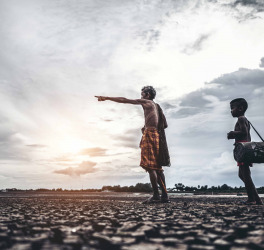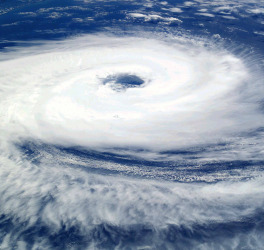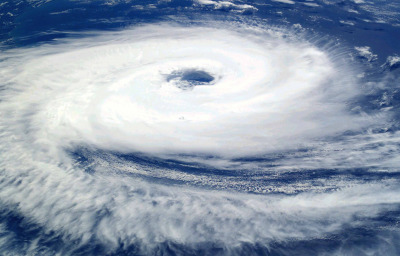
Financing for a regional project to scale up hydro-meteorological and Early Warning Services in six countries in East Africa and around Lake Victoria has been approved by the Climate Risk and Early Warning Systems (CREWS) initiative. The project is closely aligned with the UN Early Warnings for All initiative.
East Africa has a diverse terrain and climate, which, over the years, has made it more susceptible to weather- and climate-related impacts caused by natural hazards such as floods, droughts, landslides, and other severe hydro-meteorological phenomena.
Lake Victoria, Africa’s largest lake, heavily influences weather and climate conditions in East Africa, generating its own micro-climate as one of the most convectively active regions on earth. Countries in the Lake Victoria Basin (LVB) are often affected by severe thunderstorms, heavy rainfall, strong winds, high waves, lightning, hailstorms, and waterspouts. The Lake, bordered by Kenya, Tanzania, and Uganda, supports approximately 25% of its surrounding population, mainly fisherfolk.
The four-year, US$ 7 million project will build on the achievements of the recently completed HIGHWAY project, financed by the UK Foreign Commonwealth and Development Office, supporting the East African Community (EAC) in achieving its Early Warning System Vision 2025. The project is being implemented by the World Meteorological Organization (WMO), the UN Office for Disaster Risk Reduction (UNDRR), and the World Bank working closely together with several regional entities, and the National Meteorological and Hydrological Services (NMHSs) of Burundi, Kenya, Rwanda, South Sudan, Tanzania, and Uganda. The project will build capacity of the countries and regional institutions towards impact-based, people centered predictions and warnings, specific to national and local context.
Burundi and South Sudan, two countries not covered through the HIGHWAY project, will receive targeted support for institutional development through activities including the assessment of hydromet monitoring networks, early warning infrastructure and institutional capacities and the development of a roadmap for strengthening Early Warning Systems and hydromet services.
Activities being undertaken through the project are aligned with CREWS value propositions and core programme indicators, which will demonstrate concrete impacts of the project. They are further aligned with the UN Early Warning for All Initiative, led by WMO and UNDRR.
Mojwok Ogawi Modo, Director General for Meteorological Services for South Sudan stated, “In my capacity as Permanent Representative of South Sudan with WMO, I would like to express my deepest gratitude to CREWS for financing this development project. It provides a much-needed opportunity for the EAC to improve their capacities in climate change adaptation both as individual countries and as a region. The fact that the project is led by WMO and executed in partnership with The World Bank and UNDRR guarantees for the solid execution and sustainability of the project outcomes.”
Through the project, efforts will be made to:
- Enhance the capacity of NMHSs to produce and deliver short-term and severe weather forecasts and impact-based, people-centered predictions and warnings;
- Support EAC members in refreshing their common alerting protocol (CAP);
- Pilot standard operational procedures to activate existing early warning frameworks in selected countries;
- Support anticipatory action by developing stakeholder platforms to define triggers for the activation of early action;
- Include a socio-economic cost benefit (SEB) study to support investment decisions related to the UN Early Warning for All Plan; and
- Improve the integration of gender across the early warning early action value chain.
“Africa continues to face grave challenges arising from a changing climate, and we know we must step up our collective efforts particularly in climate adaptation, disaster risk reduction and resilience building for sustainable development. Integrated and impact based Early Warning Systems are a critical part of the process and can provide individuals and communities as well as Governments and decision makers with timely forecasts and warnings. This project therefore comes just at the right time, as it builds upon past and ongoing initiatives which have built the foundations for strengthening end-to-end EWS across the East Africa region,” said Dr Agnes Kijazi, Director of WMO Regional Office for Africa.
Gerard Howe, Chair of the CREWS initiative, and Head of Adaptation, Nature & Resilience at UK’s Foreign Commonwealth and Development Office (FCDO) added, “Scaling-up our effort to reach all people with early warnings within five years, as called for by the UN Secretary General, requires a focus on the needs of the most vulnerable populations and empowering them to access warnings and take early action. It also requires coherence and alignment of our collective efforts. CREWS funds will contribute to the improvement of forecasts for floods and droughts, related early warning services with tools for the visualization of predictions that result in people-centered warnings. The project will also elaborate protocols that result in anticipatory action by humanitarian actors. I am encouraged that CREWS funds are effectively aligned with, and build on, other programmes in the region such as the Finnish Meteorological Institute’s regional project (FINKERAT), the UK funded Weather and Climate Information Services (WISER) and the Systematic Observations Financing Facility (SOFF).”
The official launch for the project will take place in April 2023 in the region and will bring together key regional and national project participants.








